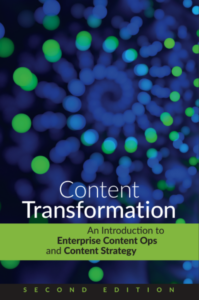The dawn of digital publishing
Is a week long enough to gain some perspective on the new landscape in ebook publishing?
If 2010 was the Year of the Many Datasheets, 2012 is looking like the Year of the EBook. We are getting numerous inquiries about how to change publishing processes to accommodate the new requirement to deliver content for EPUB and Kindle. (The Year of the Process Change Driven by New Digital Requirements may be more accurate, but it just doesn’t flow trippingly off the tongue.)
There’s been plenty of technical discussion on other sites of the major new developments: the new Kindle format, the new Apple toolset, and, especially, the licensing restrictions attached to Apple’s new iBooks Author.
[Update: A discussion of the technical problems and why it matters from ZDNet]
These are all valid issues, but they miss the larger point. We are at the dawn of digital publishing. We have a long way to go before we master our new medium.
Like the cave painters, we face enormous technical challenges (them: creating a color palette; us: creating valid EPUB or Kindle formats), archival issues (them: humidity and cracking stone; us: evolving incompatible formats), and new frontiers (them: mastering the illusion of perspective; us: employing effective 3D images).
iBooks Author provides an interesting sandbox for experimentation for publishing professionals, but no more. The current iBooks Author license only allows you to sell through the iBooks store if you develop in iBooks Author. In addition to this silly limitation, the ebook file produced by iBooks Author is not a valid EPUB; the code is full of proprietary extensions.
So what was Apple thinking when they released a beautiful, free MacOS-only application that produces ebooks for iBooks only?
This is about Amazon.
Apple is strong in education and design. Amazon’s Kindle format is doing well in ebooks and particularly cheap, self-published ebooks. Apple, as usual, is going after the high-end, high-margin market: textbooks.
They are attempting to tie up the following:
- iPad as a consumption device for textbooks.
- iBooks Author to create textbooks.
- iBooks Store as the textbook marketplace
“But why would a publisher agree to this? We have to publish to lots of different formats.”
The publishers are not the target audience for this new approach. The target audience is textbook authors—educators who already live in a MacOS/iPad universe and have no interest in other technologies. Apple’s intent is to eliminate publishers from the equation and pick up those teachers or professors who want to create one textbook for their particular area of expertise. Apple is providing tools that are simple enough for a non-professional content publisher, and that could create high-quality results. (I’m reminded of the release of PageMaker 1.0, which was also quite limited but at the same time revolutionary.)
The negative coverage of the technical details misses the point. Apple is attempting to disrupt the textbook market by:
- Providing software for content creation that will be compelling to the average textbook author.
- Providing a venue for distributing content that will be compelling to the average textbook author.
- Providing a way to produce digital content that will be compelling to the textbook user.
Apple will probably eliminate the licensing restriction within a few months—the format being created won’t render properly in other ebook readers anyway. Don’t expect them to conform too closely to the EPUB specification, though. Making an incompatible format is a competitive advantage.
Will it work? I refer you to the great Browser Wars of yesteryear for a historical (!) context. Back then, the open source movement wasn’t as strong as it is today, though.
I await new developments from Amazon.
What are your thoughts?





Bill Swallow
It truly is an interesting time. This reminds me of the historical (!) context of the Help wars (which are ongoing but not quite as vicious). We talk often of the importance of separation of content and form, and here we see the opposite happening, but in a far more corporeal manner. Proprietary tools for proprietary use by proprietary devices. I think we’ll see a shift once the competing devices achieve growing market share with greater than 80% overlap in overall features (we’re just about there). People will eventually refuse to buy two near-identical devices. If the forecast is true and we see Amazon cornering entertainment reading and Apple covering textbooks, then a shift to use open formats is likely.
Sandra Durham
Interesting thoughts. I haven’t yet played with iBook Author, but how easy is it to CREATE all that media? Click n drag to bring it into the publication is great, but there still seems to be quite the hurdle for that professor/teacher to build her own enhanced etextbook experience.
So I’m thinking there is still a strong marketing push to get textbook vendors (who are still using word as the main content source files) to drag that into iBook Author and progress from there.
What I fear – publishers who were thinking xml now thinking – why bother? just hop on iBook Author and have at it! That will work for some, but doesn’t give all the flexibility/capabilities of a fully structured intelligent content suite in XML.
Kevin S.
The thing about the Browser Wars was that Microsoft, while it temporarily won by defeating Netscape, actually helped grow the open source movement due to IE’s poor quality the lack of a proprietary, commercial alternative (well, except for Opera, which most people still haven’t heard of and wasn’t free of charge for a long time). Because Firefox emerged as IE’s only viable competition for several years, lots of people were exposed to open-source software for the first time, and other browsers eventually were created.
I expect the same thing to happen here. Apple’s noxious move to lock people in may create discontent among people who had accepted the existing ebook proprietary lock-ins (Amazon’s proprietary format, Barnes & Noble’s DRM to keep EPUB-based Nook books from working on other readers). People will accept a lot of shenanigans in exchange for a quality product, but it’s possible to go too far.
Jon J
Sarah,
This is an excellent synopsis of the current digital environment, but I fear that the analogy to the Browser wars is minor in comparison to this. While the variants in the capabilities of Browsers primarily affected the packaging of content, this war of distribution affects the content itself. Similar to the Texas textbook controversies, Apple is vying into position to define the curriculum. I am afraid that a well-packaged iBook textbook, albeit full of fallacies, could easily find its way into the school district when compared to a more static, conventional text, that is content correct.
At the same time, what are the gate-keepers? Now that it will be so simple to hack out a textbook, and publish it through the iStore, what degree of peer review will separate truth from fiction? And, will the iStore prohibit some texts, as they do some iPhone apps?
Sarah O'Keefe
@Sandra: True, there is a barrier, but consider what authors are doing now. A few get contracts with major textbook publishers. Others self-publish their textbooks—I distinctly remember, back in the dark ages, a couple of my professors who gave us photocopies of a manuscript-in-progress as the “book” for the class. iBooks Authors looks to be at about the level of early PageMaker in sophistication. Pretty manageable for a non-professional publishing type.
You and I may see the benefits of XML and structure, but it doesn’t do much for the individual author.
@Jon: Interesting that you mentioned gatekeepers and accuracy. Accuracy has been politicized by school boards in Texas and elsewhere. Given that issue, I’m not too sure that Apple as the publisher is any worse than the traditional ones.
One point that Jon’s comment made me think of: Apple’s “noxious” (nice one, @Kevin) licensing terms are equivalent to some of the “trade dress” rules in traditional publishing. For instance, if you write a For Dummies book, the author may own the actual text, but the publisher asserts ownership over the “trade dress” — the yellow cover, the various Dummies icons in the text, the overall book design. Apple is asserting that if you use their software, which allows you to make a book look a certain way, then they have some rights over how you use that instance of the content.
I don’t agree with this approach (and I think you should probably avoid iBooks Author until it changes), but if you look at the analogous rules in traditional publishing, Apple’s position is not dramatically more noxious than a book contract. (In other words, book contracts are pretty bad for authors.)
Lorraine Elder
In higher education, faculty want to create customized textbooks for their courses, usually by mixing and matching from among the best of multiple sources of information without requiring students to purchase eight different textbooks for a single course. I believe iBooks Author is aimed at that audience, not so much at publishing pros. Sure, the textbook publishers are signing up, too, because there’s money to be made when an instructor adopts a text for a course. But at my university, faculty are already inquiring about how to roll their own course books and post them on iTunes U.